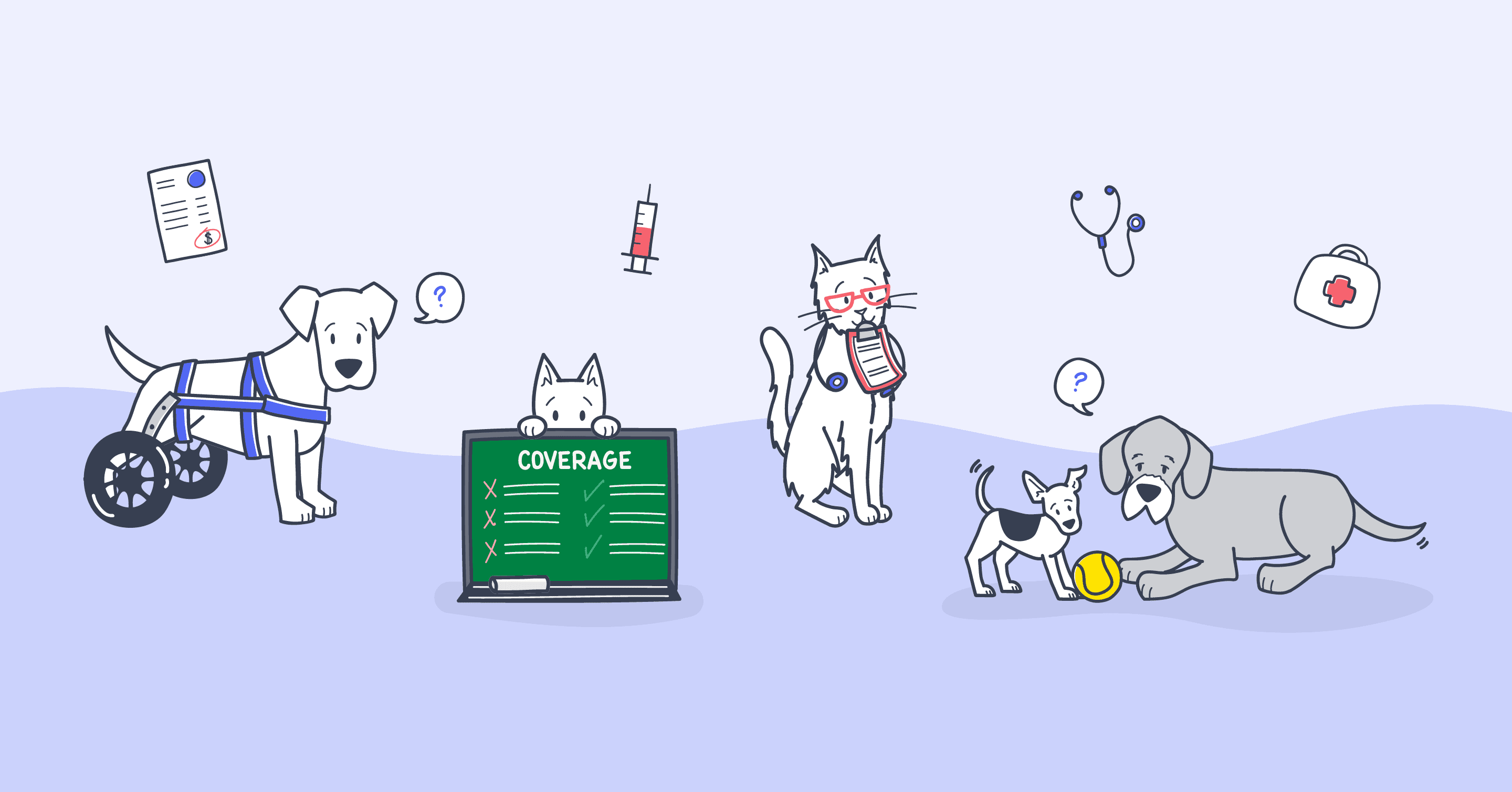Choosing the right pet insurance plan is an important decision, but if you don’t know the basics of pet insurance, understanding coverage can be confusing.
You might ask questions like, “Why doesn’t my plan cover spay and neuter surgery?” or “Do all vets accept pet insurance?”
These questions stem from common pet insurance myths that our veterinarians run into all too often. To help avoid unnecessary confusion and disappointment, we’re here to set the record straight.
Here are four common misconceptions veterinarians hear from pet owners, and the truth about getting insurance for your fur family.
1. Pet insurance is like human health insurance
Some providers refer to their pet insurance plans as pet health insurance plans, but this isn’t the most accurate description as pet insurance is not the same as human health insurance.
It may seem odd, but pet insurance actually falls under the category of property & casualty insurance. Unlike some human health insurance plans, which may cover various types of health care, including routine care like annual wellness exams and vaccines, most accident and illness pet insurance plans are designed to cover accidents and illnesses only.
It’s also important to understand that accident and illness pet insurance plans typically reimburse you directly for your pet’s eligible veterinary care costs when they get sick or hurt. It works like this:
- You pay for your pet’s veterinary treatment costs upfront.
- You submit a claim for the treatment your pet received.
- If the claim is approved, you will receive reimbursement for your covered vet bill.
It’s also important to note that, unlike a human health insurance HMO, pet insurance plans often don’t have in-network veterinary hospitals. As long as your plan doesn’t have network limitations, your pet can get treatment from any licensed veterinarian, specialist, emergency clinic, or hospital you choose in the U.S.
2. Pet insurance will never cover hereditary conditions
Hereditary, congenital, and breed-specific conditions like hip and elbow dysplasia, heart defects, kidney disease, and cataracts are extremely common. They can affect both dogs and cats of any age.
Tip: Pet insurance coverage varies between plans but an extensive coverage plan like a Pumpkin plan will cover eligible hereditary conditions. Check out this comparison page to see where coverage may differ between plans.
3. Pet insurance is the same as a wellness plan
Every pet owner wants to be able to say ‘yes’ to the best care available to their pet – and while both standard pet insurance plans and wellness plans can help do this, the two are quite different in nature.
A key difference between most standard pet insurance and preventive care plans is that standard accidental and illness pet insurance plans can help you pay for unexpected accidents and illnesses that happen in the future, while wellness or preventive care plans can help you pay for routine wellness care that pets need to stay healthy year-round. Think annual wellness visits, routine dental cleanings, or vaccines for disease prevention. Similarly, pet insurance is not designed to cover elective services, like spaying or neutering, even if there are preventive health benefits associated with them.
Remember that some wellness plans are not insurance products, while other wellness plans may be filed as insurance products. Some pet insurance providers offer them as optional add-ons for an extra fee in addition to their standard pet insurance plans.
4. Pet insurance is for older pets, not young and healthy pets.
It’s a common misconception that pets don’t need pet insurance until they’re older or more at risk for illness, but the truth is that the older pets get, the harder it may be to get reimbursed for vet bills due to things like upper age limits and pre-existing conditions.
It’s important to mention that accidents and illnesses happen to young, otherwise healthy pets more often than you think! Puppies and kittens are known to do crazy things with costly consequences, from eating random objects, to taking fracturing falls. Young pets also have more fragile immune systems than adults, making them more susceptible to picking up certain illnesses in their first year – from ear, eye, skin, and respiratory infections, to digestive illnesses and parasites. When you take your fur baby to the vet, not only are you paying for the visit itself, but also any diagnostics, testing, and medicine prescribed.
Is pet insurance really worth it?
Pet insurance is worth it, paws down. Thanks to new veterinary advancements, there are better diagnostics and treatments available to pets than ever before. But they often cost a significant amount of money. In fact, over a pet’s life, dog owners typically spend $16,100+ and cat owners typically spend $12,000+ on vet visits alone.*
Accidents and illnesses happen to pets more than you think. In fact, 1 in 3 pets will need emergency surgery every year, costing an average of $800-$1,500 or more.** All pet insurance plans from Pumpkin offer up to 90% reimbursement on eligible vet bills for covered conditions, so it’s easier to say ‘yes’ to the best care possible. You should never have to choose between the health of your pet and your wallet.
Ready to explore pet insurance options?
If you’d like to see how much a Pumpkin plan might cost you, get a quote today. We’ll fetch it for free!
To make the best choice for you and your pet, make sure to check out our useful comparison page to help you learn more about different providers’ plans.
DISCLOSURE




